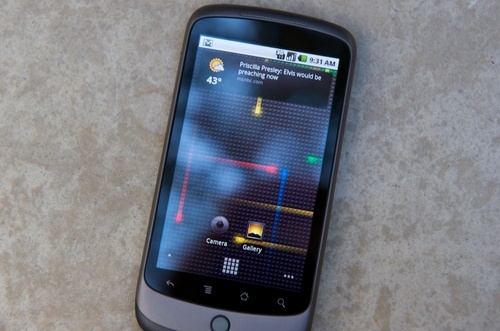
The history of the Google Nexus One is a lesson in hype, in marketing, and how one mistake can doom an otherwise solid phone. The news prompting this retrospection? Sprint has announced that it will not sell the troubled handset, dooming it to a life on perennial fourth-place network T-Mobile (and AT&T, sort of). But what happened? Wasn't the "GooglePhone" supposed to dethrone the iPhone and change the way we buy smartphones?
Rumors of the mythical GooglePhone have been around for years. The original Android phone, the T-Mobile G1, was the first smartphone to use Google's Android operating system, and could be thought of as the first real GooglePhone. But as the Android family widened to include phones made by HTC, Motorola, Samsung, and Sony (some with very un-Android-looking skins on top), rumors popped up that Google themselves were working on a phone they could truly call their own.
Fast forward to mid-December, 2009. The Motorola Droid, the very first Android 2.0 phone, has been released on Verizon to ridiculous sales (it reached a million units sold faster than the iPhone) and widespread acclaim. Google had a heavy hand in designing the Droid, which was released with an untouched version of Android. What more could they want? Yet rumors persisted, and suddenly took form: the Nexus One. It would outclass every other phone on the market. It would be sold directly by Google, bypassing the traditional carrier system. It would be the purest distillation of Android possible, because Google would design every millimeter of hardware and software.
The Nexus One was officially announced by Google on January 5th, 2010, though it was handed out to Google employees and leaked like crazy for the few weeks before the announcement. It did indeed have top-of-the-line hardware, made by Google's best Android friend, HTC. But that's where the promises stopped being fulfilled. The software? Just Android 2.1, which brought relatively minor or aesthetic changes like live wallpapers and extra homepage screens. The distribution was slightly unusual for North America, but not particularly innovative: It was sold either unlocked or locked to T-Mobile, directly by Google--European manufacturers have been selling phones this way for years.
The biggest problem? It launched on T-Mobile exclusively. T-Mobile's been a good partner for Google, but they're also the smallest of the big four wireless networks. It's the same problem that doomed Palm's Pre: No matter how good the phone is, you can't count on people switching to a different (especially not a smaller) network for it. Google also had some extra problems due to their inexperience as a retailer--users were often unable to talk to a real human at Google for support, and customer service was widely regarded as lousy. Requests were done by email, often taking several days to return an answer.
The Nexus One launched on AT&T, but only in its $530 unlocked form. Unlocked phones aren't the norm here in North America, and users balked at spending so much when competitors (like the iPhone) were subsidized. And so began the Nexus One's death. The Nexus One sold surprisingly poorly, despite pretty good reviews--only 20,000 in its first week, and by the first quarter of 2010, it had only 2% marketshare of Android phones.
Verizon launched the HTC Droid Incredible, essentially a Nexus One with HTC's Sense UI skin on top and a better camera--easily the superior option, given HTC's tweaks. And now that Sprint's upcoming HTC Evo 4G, the country's first 4G phone, is soon to see release, why would Sprint bother also stocking a phone like the Nexus One that apparently nobody wants?
The Nexus One isn't a bad phone by any stretch--it's certainly the best on T-Mobile, and one of the best currently on the market. But it's still dead. It was doomed by hype, by poor marketing choices, and by failure to live up to expectations of the smartphone revolution. If there's a Nexus Two, you can bet Google won't make those same mistakes again.Share this post with your IBM friends on facebook!
The article on the Nexus was very interesting and makes sense where the strategy for the phone fell apart.
ReplyDeleteActually, the Nexus one falls are expected by not Google but the public since the G1 is not that successful either. however, some people believe that the HTC help Google promote Android based phones very well. Android has the 2nd place of market share of phone industry just a little behind the RIM from Blackberry. The Iphone is the 3rd place. But Iphone is the best seller as a individual phone. On the coming up of the Iphone OS 4, Window Phone 7 and Android 2.2, it's going to be a good show to watch. Let's see what is the next best operation system.
ReplyDelete